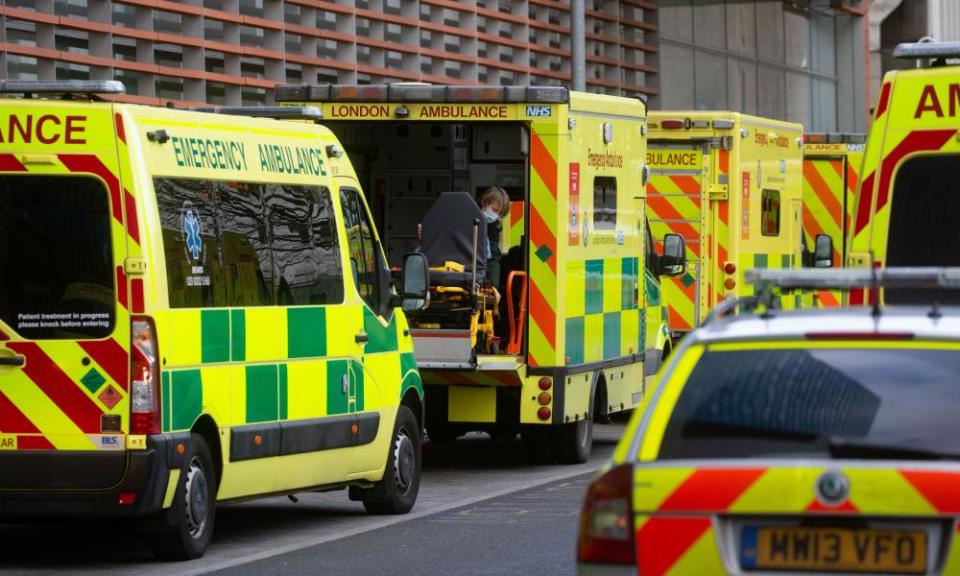Public confidence NHS can cope with Covid at lowest ever level – poll

Public confidence in the NHS’s ability to manage the huge number of people left seriously ill by the coronavirus pandemic has fallen to its lowest level since the outbreak began, new polling shows.
Just six out of 10 people believe the health service is able to care properly for those with Covid-19, more than 37,000 of whom are now in hospital. That is the lowest percentage since pollsters Ipsos Mori began asking Britons about the subject in March.
The proportion of people who are not confident in the NHS’s ability has risen to 35%, just 1% below the March peak of 36%.
Public confidence has dropped 12 points from 72% in November. That fall has coincided with widespread media coverage of the growing crisis in hospitals. London and the south-east and east of England have been worst affected, with the new variant of the coronavirus blamed for the rise in cases.
Queues of ambulances have built up outside many hospitals as A&E units have been too busy to accept patients. Intensive care units have had to expand and dilute their usual nurse-to-patient staffing ratios. One hospital in the capital became so overwhelmed that it had to go into “disaster-medicine mode”.
On Friday, it emerged that Norwich and Norfolk University hospital was so short-staffed that it had had to draft in army medics to bolster its workforce. Hospitals have been left short of key personnel due to record numbers of frontline staff – 15% in some places – being off sick or isolating because of the virus.
Confidence has dropped most sharply in London, where it now stands at 54%, Ipsos Mori found. That is down from 67% in November and is lower than the previous lowest figure – 55% – seen in March. Four in 10 Londoners say they do not have confidence in the NHS’s ability to cope.
“The current situation facing the NHS is incredibly serious and this has been reflected throughout the media over the last month,” said Chris Hopson, chief executive of NHS Providers, which represents NHS trusts in England. It is therefore understandable that public confidence in the NHS’s ability to handle that Covid-19 generated pressure has dropped.
“The fact that confidence has dropped most in London, where the pressure is greatest, shows that the two issues – the degree of pressure the NHS is under and confidence in the NHS’s ability to handle that pressure – are completely linked.
“For months now, the public has been confronted with daily reports of incredibly sick patients, strained services and exhausted staff. This survey is a reflection of the huge pressure the NHS is currently under.”
Ipsos Mori interviewed a representative sample of 1,065 British adults aged 18-75 online from 8 to 11 January. The data was weighted to match the population profile.
“Public confidence in the NHS has fallen to its lowest point in the pandemic, driven by media coverage of hospitals under pressure,” said Ben Page, Ipsos Mori’s chief executive. “In one sense this may be helpful, in encouraging the public to maintain social distancing, but the challenge will be rebuilding it after the pandemic when waiting lists will likely be at record levels.”
Confidence in the health service’s ability to cope divides sharply along party political lines. While 72% of those who voted Conservative at the 2019 general election said they were confident, just 56% of Labour voters said the same.
“As the pandemic recedes, we will need to see how public confidence in the NHS more widely is affected, once the realities of dramatically longer waiting times and ongoing staff shortages sink in,” said Richard Murray, chief executive of the King’s Fund thinktank.
“This may not be as big a risk for the NHS as it appears, since public pride and confidence in the NHS as an institution is typically high. The tremendous efforts made by the NHS and its staff through the Covid crisis are well understood by the public and, just as in past crises, may lead them to look elsewhere for someone to blame – with the government usually at the top of the list,” he added.
A Department of Health and Social Care spokesperson said: “The NHS is pulling out all the stops to respond to the biggest global health threat in a century, while also ensuring that people of all ages can still access the services they need.
“We are determined to support the NHS in every possible way, investing £52bn this year and £20bn next year to help the health service fight coronavirus.
“The government is working hard to make sure the NHS has enough capacity to meet increased demand and can continue to provide vital care and services in hospital for those who need it.”

 Yahoo Finance
Yahoo Finance 